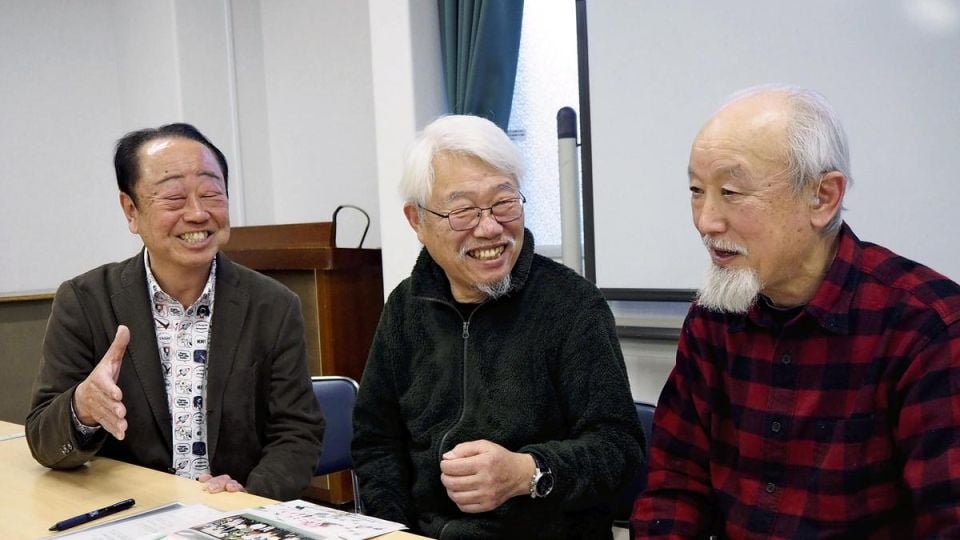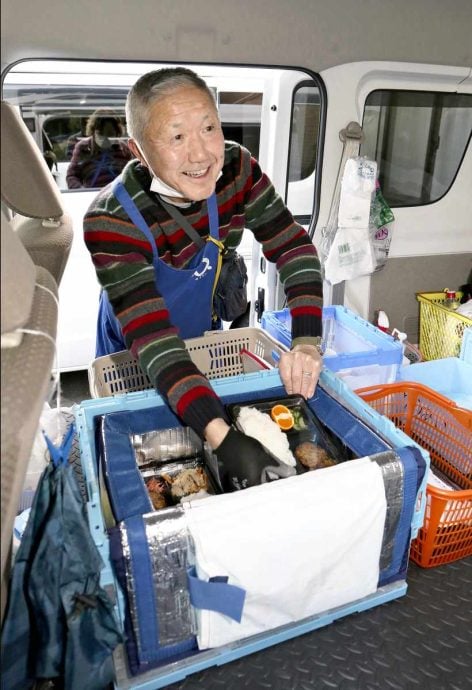
TOKYO : This is said to be the era of the 100-year lifespan, when people live for a long time after they retire from work. And if you have a lot of years to live, won’t you want to make them fulfilling? Once your office no longer provides you with a place to belong, why not find a new one in your local community?
I explored ways to make your “community debut” by participating in community activities like volunteer work and hobby circles.
Volunteering with peers
One afternoon in mid-January, Susumu Takahashi, 73, wearing a blue apron, loaded bento boxed meals containing satsumaage deep-fried fish paste and other ingredients into his car. He got behind the wheel, raised his right hand to wave goodbye and set off. He spent the next hour and a half delivering the bento boxes to about 10 homes where elderly people live.
Since 2021, Takahashi has done paid volunteer work about 10 times a month for a public interest incorporated foundation that provides home welfare services in Chofu, Tokyo.
“When I worked for a company, I was rarely told thank you to my face. Now, I receive thanks from users and staff members, and it feels great,” he said. “That gives me a motivation to work hard for them,” he added.
Before he resigned from his job as an advertising company executive in 2021, he had not paid much attention to his local community. But he learned that mutual support and connections between local residents are crucial when natural disasters occur, and so he decided to learn more about his own community. Then, when he was reading a city newsletter, he noticed an ad soliciting volunteers for the foundation he now works with. Thinking, “I might be able to help them,” he applied, and this led to him making his community debut.
At first, with no particular interest in welfare or volunteering, he was nervous. He wondered if he would be able to keep up the work. But seeing other volunteers of various ages working vigorously and enthusiastically has given him the inspiration to continue. Even when he is admonished by young staff members, he says, “I try to readily accept their warnings and advice.”
As he is delivering meals in the evening, he encounters elderly people out for a stroll and parents coming and going, carrying their children on electric bicycles. Scenes like this are new to him; he never saw them when he was working for the company.
In addition to meal delivery, his volunteer activities also include cleaning up the homes of elderly people. When he is at home, his wife gives him advice on cleaning methods, which gives them an opportunity to have lively conversations.
“Life after retirement is long. When I talk to people, I don’t just want to talk about my professional experiences but also about my volunteer work since I retired,” he said, with an expression of total fulfillment.
Supporting community debut
In July 2023, the city of Sano, Tochigi Prefecture, implemented a law of a kind that few other Japanese municipalities have tried: an ordinance to help senior citizens make their community debut. The ordinance says it is important for retired people to stay connected to society through work, hobbies, volunteering and other activities. The ordinance is aimed at building a society where senior citizens can live happily in their local communities, according to Sano Mayor Yutaka Kaneko.
The municipal government created a manual for making community debut, which recommends “Imakatsu,” a word coined by the government that means “activities that allow you to enjoy your life by rediscovering things that you like or are interested in at this moment.”
Writing down things that you used to like when you were young or those you want to try now can help you find activities that you may want to start. As for things that you are good at, you can choose an answer from options such as “I can teach it to others” and “I want to learn from someone else so I can master it,” to help you decide how to pursue your activities.
An easy way to make your community debut is to participate in preventive care classes or hobby courses. Also, if you find a hobby, such as collecting Goshuin stamps, assembling models, singing in a chorus or visiting historical places, you can make friends and learn about the attractions of your community. “We hope retired people will not hesitate to start something new and enrich their lives,” said one municipal government official.
Finding favorite activities

Tokyo’s Setagaya Ward is home to a citizens’ group that helps people make their community debut. Tatsuro Usui, 74, the representative of the group, explained some important points for enjoying community activities after retirement.
Flyers and leaflets introducing community activities are available at community centers and other facilities; information can also be found on the internet. If you find an activity you want to join, don’t overthink it — just give it a try. Some groups allow new people to participate in their activities on a trial basis for a certain period of time. Participating in multiple activities will help you find activities you enjoy or people you like. If you don’t like an activity, you can quit. There’s no need to force yourself to continue.
Some people who were in management positions or experienced employees before retirement may find it difficult to stop treating other people as if they are subordinates. However, you should use the Japanese honorific suffix “san” when addressing other people regardless of how old they are or how long they have been participating in the activity. It’s vital to show respect for every person’s life experiences.
People in their 60s are usually the oldest ones at a company, but among the senior generation they are still young. Their participation can breathe fresh energy to the activities they take part in. Hopefully these people will enliven their communities with new feelings and ideas.
ADVERTISEMENT
ADVERTISEMENT








































